When designing an outdoor kitchen, cement countertops have become a popular choice due to their durability, versatility, and timeless aesthetic. Unlike other materials, cement is incredibly resilient, making it ideal for outdoor environments where it will be exposed to the elements. Cement countertops offer a blend of form and function, providing a surface that is not only attractive but also capable of withstanding the wear and tear of outdoor cooking. The ability to customize cement countertops further enhances their appeal, allowing homeowners to create a unique look that complements their outdoor kitchen design.
Cement countertops are highly customizable, making them an excellent choice for those who want a specific design tailored to their space. Unlike prefabricated countertops, cement can be poured and molded into any shape or size, allowing for unique designs such as curved edges, integrated sinks, or personalized textures. This level of customization enables homeowners to achieve a seamless integration with their outdoor kitchen, matching countertops with other outdoor elements like the cabinetry, grill, or dining areas. Additionally, the ability to add pigments or stains to the cement mix means that a wide range of colors and finishes can be achieved, ensuring the countertop aligns perfectly with the overall aesthetic of the outdoor space.

One of the primary advantages of using cement for outdoor kitchen countertops is its durability. Cement countertops are incredibly tough, able to withstand heavy use, high temperatures, and varying weather conditions. This makes them particularly suited for outdoor settings, where they are likely to be exposed to sun, rain, and fluctuating temperatures. Properly sealed cement countertops are also resistant to stains, spills, and scratches, ensuring that they remain in excellent condition even after years of use. This longevity makes cement an economical choice for those looking to invest in a countertop that will last for decades without needing frequent replacement or repair.
Cement’s inherent strength doesn’t mean that it’s impervious to damage, however. Without proper sealing and maintenance, cement countertops can become vulnerable to stains, cracks, or moisture infiltration. Sealing the countertop with a high-quality, UV-resistant sealer is essential for protecting it from outdoor elements, such as rain or direct sunlight, which can lead to discoloration or structural issues over time. A good sealer will not only protect the countertop but also enhance its appearance by providing a smooth, polished finish that showcases the natural beauty of the cement. Regular resealing is recommended to ensure the countertop continues to perform optimally.

The thickness of cement countertops can be customized based on the desired look and functional requirements. While thicker countertops can give an outdoor kitchen a more robust, solid appearance, thinner designs offer a sleek, modern aesthetic. Thicker countertops generally provide more strength and durability, which is useful in outdoor settings where they may be subjected to heavier impacts or stresses. However, thinner countertops can still be quite durable, especially if reinforced properly with materials like rebar or wire mesh. The flexibility to adjust the thickness ensures that cement countertops can fit a variety of design preferences and functional needs.
Another advantage of cement countertops is their eco-friendliness. Cement is a sustainable material that can be sourced locally, reducing the environmental impact associated with transportation. Additionally, recycled materials such as glass, metal, or stone can be embedded in the cement mixture, creating a countertop that is both unique and environmentally responsible. This feature is especially attractive to homeowners looking for green building solutions, as cement countertops can contribute to a more sustainable outdoor kitchen design. The ability to recycle and reuse materials further enhances the eco-conscious appeal of cement.
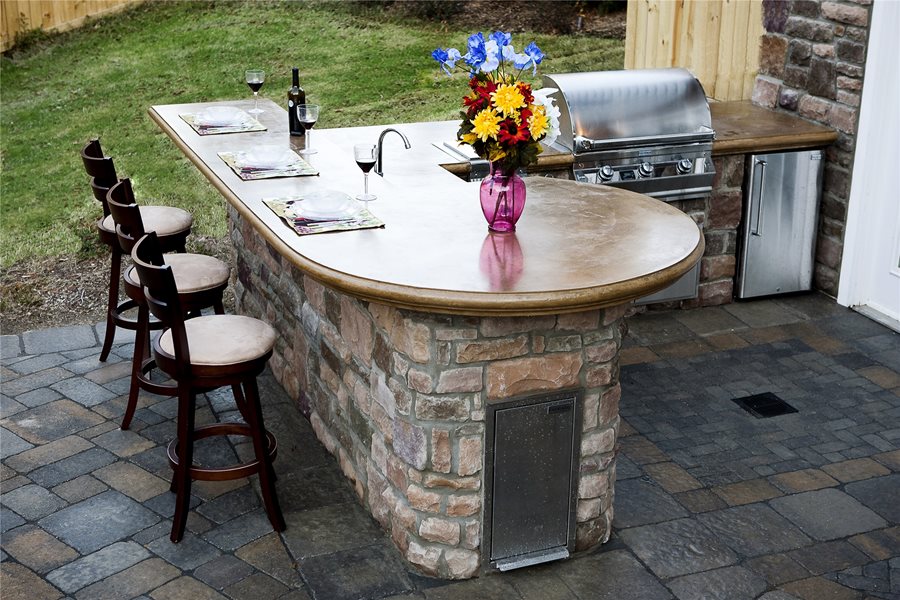
For outdoor kitchens, cement countertops can be designed to complement a wide range of other materials, such as wood, stone, or metal. The neutral tones of cement can create a balanced contrast with the warmth of wood or the ruggedness of stone, offering a harmonious blend of textures and finishes. This versatility in design allows cement countertops to fit seamlessly into different outdoor styles, from rustic and traditional to sleek and modern. By pairing cement with complementary materials, homeowners can create a cohesive outdoor kitchen space that feels both functional and inviting.
The maintenance of cement countertops in an outdoor kitchen is relatively simple, but it does require some attention to ensure longevity. The key to keeping cement countertops looking their best is regular cleaning and resealing. Cleaning should be done with mild soap and water, avoiding harsh chemicals that could damage the sealer. Resealing the countertop every few years helps to maintain its protective barrier, ensuring that moisture and other outdoor elements don’t cause damage. In addition, it’s important to address any minor cracks or chips as soon as they appear to prevent them from becoming larger problems over time.
Cement countertops can be designed with integrated features, such as sinks, cutting boards, or even grills, which can further enhance the functionality of an outdoor kitchen. By embedding these elements directly into the countertop, homeowners can create a seamless, efficient workspace that makes outdoor cooking and entertaining easier. Integrated features not only add to the convenience of the space but also provide a clean, uninterrupted design that enhances the overall aesthetic of the outdoor kitchen. These custom touches can be designed to fit the specific needs of the homeowner, making the outdoor kitchen both highly functional and visually appealing.
In addition to integrated features, cement countertops can be enhanced with decorative elements such as inlays, patterns, or textures. For example, homeowners can choose to embed materials like glass or metal into the surface of the countertop to create a striking visual effect. Alternatively, custom molds can be used to create textured finishes that mimic natural stone or wood, adding a unique, handcrafted feel to the space. These decorative options allow homeowners to personalize their outdoor kitchen in a way that reflects their style and creativity, while still benefiting from the durability and functionality of cement.

Cement countertops can also be designed with drainage systems or built-in grooves to make outdoor cooking and cleaning more efficient. These design features help to direct water away from the cooking area, keeping the countertop dry and preventing the buildup of standing water, which can lead to staining or mold growth. By incorporating functional design elements like drainage grooves, homeowners can create an outdoor kitchen that not only looks beautiful but also performs optimally in a variety of weather conditions. These practical features enhance the usability of the outdoor kitchen, making it easier to maintain and enjoy.
Cement countertops are also heat-resistant, which makes them ideal for outdoor kitchens where grills, stoves, or fire pits may be in close proximity. Unlike some materials that can crack or warp when exposed to high heat, cement is capable of withstanding extreme temperatures without being damaged. This heat resistance provides peace of mind for homeowners, knowing that their countertop won’t be affected by the high temperatures associated with outdoor cooking. Additionally, cement’s heat resistance makes it a safe and practical surface for preparing food in an outdoor setting.
While cement countertops offer many advantages, it’s important to note that they are heavy and may require additional support when being installed. The weight of cement countertops can put a significant strain on the underlying cabinetry or framework, especially in outdoor kitchens where structural support may be different than in an indoor setting. Proper planning and consultation with a contractor are essential to ensure that the countertop is adequately supported and installed correctly. Failure to provide the necessary support can lead to structural issues or even damage to the countertop itself.
Finally, one of the most appealing aspects of cement countertops for outdoor kitchens is their ability to age gracefully. Over time, cement develops a natural patina that enhances its character and gives it a unique, weathered look. This patina is part of the charm of cement, especially in outdoor settings where it can complement the natural environment. As long as the countertop is properly maintained, this aging process doesn’t compromise its structural integrity but rather adds to its visual appeal. For homeowners who appreciate materials that tell a story over time, cement countertops offer a durable and beautiful solution.

Common Mistakes to Avoid
One common mistake with cement countertops is neglecting the importance of sealing. Without proper sealing, the countertop is vulnerable to moisture, stains, and weather damage, especially in an outdoor setting.
Another frequent error is improper mixing of the cement, which can lead to weak or uneven countertops that are prone to cracking. It’s also crucial to avoid skipping reinforcement, as this can result in structural weakness. A lack of attention to detail during installation, such as failing to level the countertop or allowing air bubbles to form, can cause significant issues down the line. Lastly, ignoring regular maintenance, such as cleaning and resealing, can shorten the lifespan of the countertop.
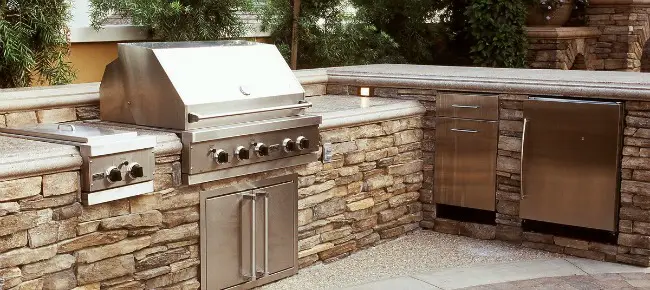
How long do cement countertops last in an outdoor kitchen?
Cement countertops, when properly maintained, can last for decades in an outdoor kitchen. Their durability is one of their key advantages, as they are designed to withstand harsh weather conditions, high usage, and heat. Regular sealing and cleaning are essential for preserving the countertop’s strength and appearance over time. As long as these steps are followed, cement countertops can remain functional and attractive for many years, making them a long-term investment for any outdoor kitchen.
Are cement countertops heat-resistant?
Yes, cement countertops are highly heat-resistant, which makes them ideal for outdoor kitchens where grills and stoves are often used. Cement can withstand high temperatures without cracking or warping, unlike some other countertop materials. However, while cement is heat-resistant, it’s still recommended to use trivets or heat pads to prevent direct contact with extremely hot cookware, as repeated exposure to high heat can gradually wear down the sealer.
Do cement countertops require a lot of maintenance?
Cement countertops require regular maintenance to keep them in top condition, but the process is relatively simple. Cleaning with mild soap and water and resealing the countertop every few years are the primary maintenance tasks. Resealing is crucial, especially in an outdoor kitchen, as it helps protect the countertop from moisture, stains, and UV rays. Addressing any small cracks or chips as they appear can also prevent larger issues from developing, ensuring the longevity of the countertop.
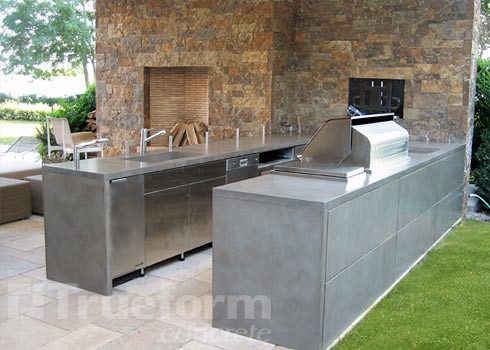
Can cement countertops be customized?
Absolutely, cement countertops are highly customizable. They can be molded into any shape or size and can include integrated features like sinks or grills. Homeowners can also choose from a wide variety of finishes, textures, and colors, thanks to the ability to add pigments or stains to the cement mix. Decorative elements like embedded glass or metal can also be added to create a unique design. This flexibility makes cement countertops an excellent option for those who want a personalized outdoor kitchen.
Are cement countertops eco-friendly?
Cement countertops can be an eco-friendly choice, especially when made with locally sourced materials. Cement itself is a sustainable material, and recycled materials such as glass, stone, or metal can be embedded into the countertop to reduce waste. Additionally, cement countertops are long-lasting, reducing the need for frequent replacements and lowering the overall environmental impact. For homeowners looking to build a green outdoor kitchen, cement countertops are an excellent option.
What should I consider when installing cement countertops in an outdoor kitchen?
When installing cement countertops in an outdoor kitchen, it’s important to ensure proper support for the countertop’s weight. Cement is a heavy material, and without adequate structural support, the countertop may sag or crack over time. Consulting with a contractor to ensure that the underlying cabinetry or framework is strong enough to support the countertop is essential. Additionally, taking the time to seal the countertop properly and regularly maintain it will help ensure that it remains in good condition despite exposure to the elements.
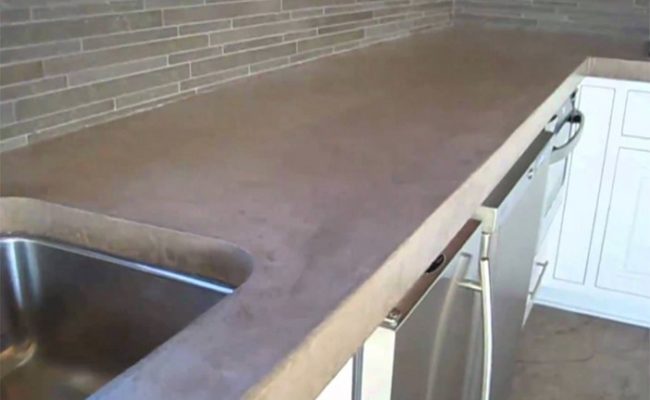
Outdoor Concrete Countertop

Pin on If I Ever Garden

Outdoor Concrete Project Gallery CHENG Concrete Exchange Outdoor grill

Modern and Stylish Glass Kitchen Countertop Ideas
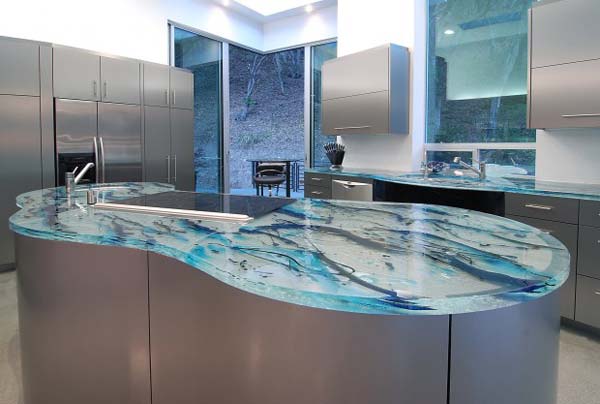
Related Posts:
- What Types Of Kitchen Countertops Are There
- Smart Kitchen Countertop
- Average Cost For New Kitchen Cabinets And Countertops
- Replacing Kitchen Countertops DIY
- Is Soapstone Good For Kitchen Countertops
- White Kitchen Countertops And Backsplash
- Kitchen Countertop Installation DIY
- Best Countertop Material For Outdoor Kitchen
- Kitchen Tile Backsplash Ideas With Granite Countertops
- Frosty Carrina Kitchen Countertops